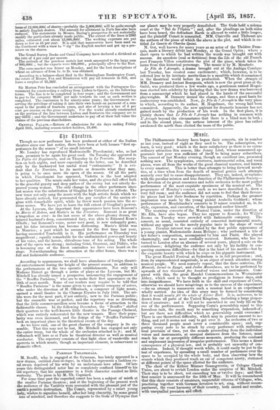g4t tf rairts.
Though no new performer has been produced at either of the Italian theatres since our last notice, there have been at both houses "first appeafances for tho season" of no small interest. Mr. Lumley has reproduced Mademoiselle Piccolomini ; who, as last year, promises to be again his great card. On Tuesday she appeared in La Figlia del Reggimento, and on Thursday in La Traviata. Her reception on both nights, and more especially on the latter, can be described only by the hackneyed but useful word "enthusiastic." It is evident that La Traviata, be its merits or demerits what they may, is going to be once more the opera of the season. Of all the parts in which l'iccolomini has appeared, Violetta is the best adapted to her qualities. The music suits her voice, and she gives full effect both to the graceful gayety and deep pathos of the erring but not utterly depraved young woman. The only change in the other performers since last season was the substitution of Giuglini for Calzolari in Alfredo. The now tenor not only sang the music with the high artistic finish which we have already noticed, but personated the gay cavalier of the ancien regime with remarkable spirit, while he threw much passion into the serious scenes. We have yet to learn the full extent of Giuglini's powers.
At the Lyceum, the important first appearances have been Ronconi's in Maria di Itohan, and Mario's in the Y'roratore. Ronconi is as great a tragedian as ever : in the last scene of the above gloomy drama, the injured husband's deep, concentrated fury, was akin to Edmund Kean's Othello ; but Ronconi's voice, never very good, is now unhappily gone, and his false intonation has become distressing. Mario's debilt was in Manrico ; a part which he assumed for the first time last year, having succeeded Tamberlik in it. His performance on Thursday was magnificent ; equally remarkable for the undiminished power and beauty of his voice, and the heroic, chivalrous tone of his acting. The whole east of the opera was strong ; including Grisi, Graziani, and Didiec, who is becoming one of tho finest contraltos we have ever heard on the stage. Notwithstanding the attraction at the other house, there was a full and fashionable audience.
According to appearances, we shall have abundance of foreign theatrical entertainment during the height of the present season, in addition to the performances at the two operatic establishments. Not only -will Madame Ristori go through a series of plays at the Lyceum, but Mr. Mitchell has already issued a prospectus announcing the engagement of the " Bouffes Pensions, ' who are to make their first appearance on the 20th of next month. Some of our readers may require to be told that " Bouffes Parisiens" is the name given to an especial company of actors, who under the direction of M. Offenbach, a composer of light music, opened a small theatre in the Champs Elysees in July 1866. The artists were for the most part, if not entirely, new to the Parisian public ; but the ensemble was so perfect, and the repertory was so diverting, that the little summer-pavilion soon became a focus of attraction to the fashionable classes. In the following December, the " Bouffes " shifted their quarters to the well-known little theatre in the Passage Choiseul, which was entirely redecorated for the new tenants. Here their popularity was even increased, and the doings of the " Bouffes Parisiens" took an important place in the theatrical events of the day. As we have said, ono of the great charms of the company is its ensemble. That this may not be lost, Mr. Mitchell has engaged not only the entire troop, but the whole of the orchestra attached to it ; and M. Offenbach will hero as at Paris be theatrical director as well as musical conductor. The repertory consists of that light class of vaudeville and operetta in which music, though an important element, is subservient to dramatic effect.
























 Previous page
Previous page